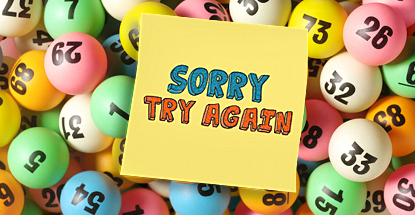 Lottery operators are hoping the promise of larger jackpots will offset the fact that they’re making those jackpots much harder to win.
Lottery operators are hoping the promise of larger jackpots will offset the fact that they’re making those jackpots much harder to win.
Last month, UK lottery operator Camelot announced it was adding 10 more balls to the National Lottery’s existing 49 balls. In doing so, it has raised the odds of winning the jackpot from 14m-to-1 to 45m-to-1. (The odds of being struck by lightning in the UK are a mere 3m-to-1.) The changes will take effect in October.
Camelot boss Andy Duncan claims the intent was to “keep the game fresh” but critics claim it’s a shameless ploy to get players to buy more tickets to boost their odds of winning. To smooth players’ ruffled feathers, Duncan says Camelot has added two new £1m raffles per week while players who match just two numbers will now win a lucky dip ticket for a future draw.
Similar changes are afoot for America’s multistate Powerball lottery. At present, players select five numbers from 59 numbered white balls while the sixth ball – the titular Powerball – is drawn from a set of 35 red balls. Come Oct. 4, 10 balls will be added to the 59 while the number of red balls will fall to 26.
The net result of these changes will be a significant increase in the odds against winning the jackpot, from 175m-to-1 to 292m-to-1. Powerball operators are banking on the fact that while jackpots will be harder to win, they will grow larger, opening up the possibility of the nation’s first $1b jackpot.
History has demonstrated that the higher a jackpot grows, the more non-traditional lottery players opt to buy tickets. Conversely, in the absence of a mid-nine-figure jackpot, sales grow stagnant due to what operators refer to as ‘jackpot fatigue.’
There are 43 US states in which lotteries are legal and Americans spent $70.1b on lottery products last year. Residents of Rhode Island spent the most per capita ($800), followed closely by South Dakota, Massachusetts, West Virginia and Delaware. The average spend per US adult was around $300. Spending was lowest in North Dakota, Oklahoma, Montana, New Mexico and Nebraska.
Lotteries earn a lot of money for their state governments, although they’ve been criticized as a regressive tax on citizens who can least afford to pay it. A Duke University study from the 1980s determined that the poorest one-third of US households purchased one-half of all lottery tickets.
Other studies have demonstrated that online gambling is largely an activity enjoyed by individuals in higher economic brackets. Yet most US state governments are either undecided on or openly antagonistic toward online gambling, while happily taking milk money from poor kids. Maybe Donald Trump is the president America deserves after all.
